How to Create an Altar without Breaking the Bank
 One of my readers asked me to cover how to create an altar. It surprised me a bit, because while I do have an altar, you don’t have to have an altar. I tend to use my altar for offerings and to hold objects I deem sacred to me and to the gods. Many Heathens, myself included, have done just fine without an altar for a long time. That being said, many Heathens have altars so that they may have a place to leave offerings, to pray, and to keep things sacred to them, such as their runes.
One of my readers asked me to cover how to create an altar. It surprised me a bit, because while I do have an altar, you don’t have to have an altar. I tend to use my altar for offerings and to hold objects I deem sacred to me and to the gods. Many Heathens, myself included, have done just fine without an altar for a long time. That being said, many Heathens have altars so that they may have a place to leave offerings, to pray, and to keep things sacred to them, such as their runes.
Your altar doesn’t have to break the bank — you can go elaborate or not. And you can choose what belongs on your altar. If the primary purpose for your altar is to honor the gods, that’s great. If you honor the wights on the altar, fantastic. Honoring the ancestors is good too. And, if you honor all three or a combination of the three, that’s perfectly acceptable.
Where to Put Your Altar
Your altar can be anywhere in your house where you are. Most people clear off a shelf or a small table to put their sacred objects on. Some people use a shelf or two in one of their bookcases, which is also very useful. Whatever you do, be sure to use that space only for your altar and nothing else. Sure, if you have a bookcase, you can have other shelves filled with books or whatever, but the altar should be considered a sacred space.
If you don’t have something that will work for an altar, you might need to buy an end table, coffee table, or bookshelf. If you’re strapped for cash, consider going to secondhand stores and yard sales. Get on freecycle and ask someone to donate a small table or bookcase for your needs. Where I live, entertainment centers that housed tubed TVs are no long in fashion since flat-screen TVs and are available dirt cheap or even free. Do some looking around and you’ll probably be able to score one. Those entertainment centers are just the ticket for an altar.
What to Put on Your Altar
A lot of people put statues of their gods, Mjolnir, and other symbols which remind them of their gods. If you’re honoring certain ancestors, you probably want to include photographs of the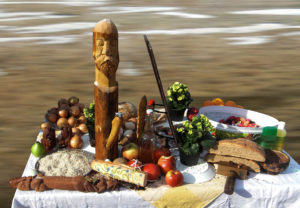 person you want to honor, if you have one. If not, maybe a certain thing they gave you, or maybe something that reminds you of them. Honor the wights in your area, by including a small rock, dried leaf, or even a pine cone or piece of a branch can symbolize the wight or wights you wish to honor.
person you want to honor, if you have one. If not, maybe a certain thing they gave you, or maybe something that reminds you of them. Honor the wights in your area, by including a small rock, dried leaf, or even a pine cone or piece of a branch can symbolize the wight or wights you wish to honor.
If you can’t afford statues of the gods, or you haven’t found a statue that suits you, you can always create your own drawings, or if you’re not that artistically inclined, pick up things that remind you of the god. For example, you may want to have an image of a horse for Odin (Sleipnir)
You should definitely put your runes there as well as the cloth that you cast them on. You will also want to have bowls on the altar to put offerings in.
Creating Your Own Runes
If you don’t have runes, they’re pretty easy to make. You can make some easily by choosing interesting pebbles or small rocks and mark or paint the runes on each of them. You’ll need 24 for the Elder Futhark runes. If you do go this route, buy some varnish or clear coat to ensure that the markings stay on them. Since you’re using permanent markers, you can get pretty wild with the colors, including metallic ones. If you’re more craftsy than I am, you can make your own wood runes out of a tree branch that has been cut into 24 pieces. Burn the runes into the wood and shellac or clear coat them to preserve them. I’ll cover more rune ideas in a later post.
A Note on Gods, Jotunn, Wights, Ancestors
The reader who asked me to cover creating an altar told me about how a group of so-called Heathens told him that he wasn’t Heathen unless he only honored the ancestors. Baloney. Heathens honor the gods,–including the gods who are most special to them–the wights, and even the Jotunn. While many Heathens find help directly from their ancestors and wights, many other Heathens honor the gods, especially those gods who have aided them. If you’re new to Heathenry and you’re not sure which gods you should honor, go with those gods whom you relate to best. For example, Odin, Thor, Heimdallr, and Freyja may have piqued your interest. If so, plan on adding something to your altar that will remind you of them. Maybe you found a Christmas ornament in the shape of red skis. That could work for Skadhi or Ullr. I have a green stone with a golden fox on it. I have that for Loki, since foxes are known as tricksters.
There are plenty of ways to come up with something that will work for you, even if you are on a tight budget. With a little ingenuity, you can come up with an altar that will work for you.
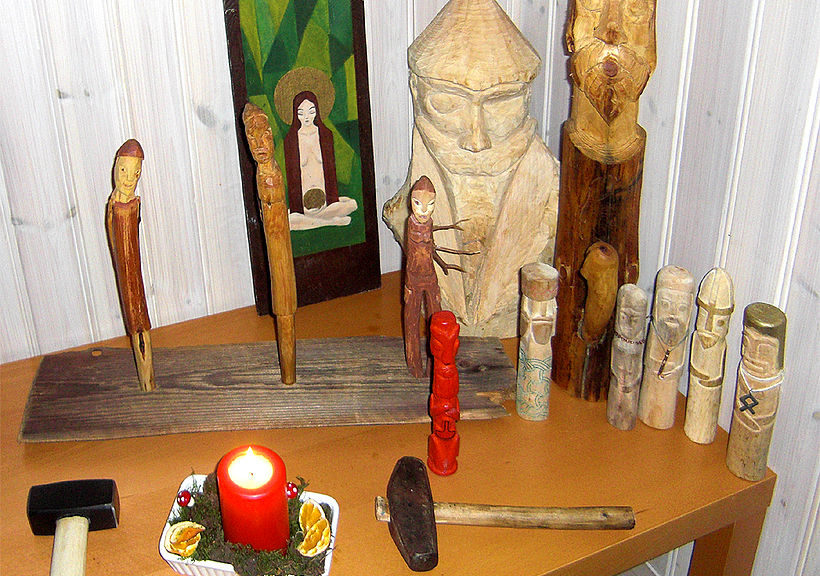


 Oh boy! The Rational Heathen gets to weigh in when it comes to sex rites. Look, before we get started, if you’re all for sex rites, orgies, and kink in your life, this post isn’t for you. You can merrily go about your business and have fun. No, this is for those folks who are a bit on the uncomfortable side when it comes to joining in a sex rite that is purportedly Heathen.
Oh boy! The Rational Heathen gets to weigh in when it comes to sex rites. Look, before we get started, if you’re all for sex rites, orgies, and kink in your life, this post isn’t for you. You can merrily go about your business and have fun. No, this is for those folks who are a bit on the uncomfortable side when it comes to joining in a sex rite that is purportedly Heathen. folks are closer to celibate and some are swingers. Some are into BDSM. What you do in your bedroom and is between consenting adults is pretty much your business. A large number of heathens are gay and lesbian, according to interesting polls. That being said, let me reiterate: what you do in your bedroom and is between consenting adults is pretty much your business. I’m not talking about you. No, I’m talking about coerced sex rights. I’m talking about people who claim you can only know a god or goddess if you perform sex with them or their members.
folks are closer to celibate and some are swingers. Some are into BDSM. What you do in your bedroom and is between consenting adults is pretty much your business. A large number of heathens are gay and lesbian, according to interesting polls. That being said, let me reiterate: what you do in your bedroom and is between consenting adults is pretty much your business. I’m not talking about you. No, I’m talking about coerced sex rights. I’m talking about people who claim you can only know a god or goddess if you perform sex with them or their members.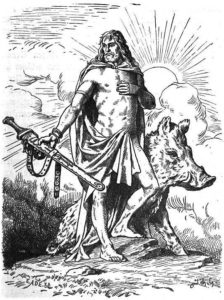 I honestly couldn’t see the problem. The information looked decent enough, but I trust Tyr. It was a couple of years later when Tyr’s words proved spot on. I ran across several conversations how this person used their students for sex rites. Now, I don’t know the entire situation, but when a mentor starts using students for sex, it is a violation of trust. Sure, they might be willing, in the hopes of gaining more knowledge or favors from the fertility and sex gods, but seriously? It is taking advantage of another person. And that, my friend, is where I have a huge issue with it.
I honestly couldn’t see the problem. The information looked decent enough, but I trust Tyr. It was a couple of years later when Tyr’s words proved spot on. I ran across several conversations how this person used their students for sex rites. Now, I don’t know the entire situation, but when a mentor starts using students for sex, it is a violation of trust. Sure, they might be willing, in the hopes of gaining more knowledge or favors from the fertility and sex gods, but seriously? It is taking advantage of another person. And that, my friend, is where I have a huge issue with it.
 Although Tyr is my main god, sometimes other gods step into my life in a big way. It’s not uncommon for me to hear from Loki, Skadi, Thor, and Freyja, but lately Freyr has been making himself known. It’s not that Tyr isn’t important–it’s just that Freyr needs to assert himself in my life. If you’ve ever had one god step into your life
Although Tyr is my main god, sometimes other gods step into my life in a big way. It’s not uncommon for me to hear from Loki, Skadi, Thor, and Freyja, but lately Freyr has been making himself known. It’s not that Tyr isn’t important–it’s just that Freyr needs to assert himself in my life. If you’ve ever had one god step into your life One thing to keep in mind is to pay attention to what the new god or wight has to say, even if they simply show up on your doorstep unannounced. Maybe you don’t have a problem that needs their expertise–yet. Maybe they know something you don’t and are there to help you through something which will be going on in your life. Still, other gods simply show up uninvited because you’ve piqued their interest for some reason.
One thing to keep in mind is to pay attention to what the new god or wight has to say, even if they simply show up on your doorstep unannounced. Maybe you don’t have a problem that needs their expertise–yet. Maybe they know something you don’t and are there to help you through something which will be going on in your life. Still, other gods simply show up uninvited because you’ve piqued their interest for some reason.
 Where the fuck did April go? I swear, it was just the first week when I promised myself to sit down and write. Only there were plenty of distractions, most of them from working as a professional writer and a small-time rancher. Like predators entering the horse pen. Or trying to avoid the bear coming around to investigate things. Or my computer of five years taking a crap.
Where the fuck did April go? I swear, it was just the first week when I promised myself to sit down and write. Only there were plenty of distractions, most of them from working as a professional writer and a small-time rancher. Like predators entering the horse pen. Or trying to avoid the bear coming around to investigate things. Or my computer of five years taking a crap. what he promised in his religion. Our gods can be very personal in our lives, but they’re not interested in controlling your life the way the Christian god does. This can be somewhat frightening when we’ve been treated like children most of our lives by one religion and then told to step up and put on the adult pants when we change to Heathenry. Yes. it can even be terrifying when you realize that prayer isn’t going to pay the rent, put food on the table, or better your life. Our gods are a resource of inspiration and yes, knowledge, we can tap into. They can comfort us or urge us to action, but they seldom get involved directly.
what he promised in his religion. Our gods can be very personal in our lives, but they’re not interested in controlling your life the way the Christian god does. This can be somewhat frightening when we’ve been treated like children most of our lives by one religion and then told to step up and put on the adult pants when we change to Heathenry. Yes. it can even be terrifying when you realize that prayer isn’t going to pay the rent, put food on the table, or better your life. Our gods are a resource of inspiration and yes, knowledge, we can tap into. They can comfort us or urge us to action, but they seldom get involved directly.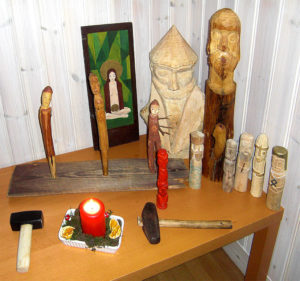 The gift for a gift is a nice thought, but I think it’s more important to have a conversation with our deities. When you have familiarity with the gods you ask help from, you’re more likely to get it than if you just approach a god out of the blue. For example, it’d be foolish for me to solicit Heimdallr for help even though he’s part of our pantheon. Why? Because I don’t have a rapport with Heimdallr. I have more of a rapport with Loki than with him, oddly enough. But even though I do have a rapport with Loki, when I ask for help, it’s usually advice. I know his advice can be good or bad, and it’s up to me to determine what the trickster is actually saying. For advice, I trust Tyr, Thor, Freyr, Freyja, and Skadi. They’re pretty my go-to gods, but if it’s not in an area they have domain over, they will refer me to others to speak with. In that case, I know they’ve already at least introduced me to the god or goddess I need to talk with.
The gift for a gift is a nice thought, but I think it’s more important to have a conversation with our deities. When you have familiarity with the gods you ask help from, you’re more likely to get it than if you just approach a god out of the blue. For example, it’d be foolish for me to solicit Heimdallr for help even though he’s part of our pantheon. Why? Because I don’t have a rapport with Heimdallr. I have more of a rapport with Loki than with him, oddly enough. But even though I do have a rapport with Loki, when I ask for help, it’s usually advice. I know his advice can be good or bad, and it’s up to me to determine what the trickster is actually saying. For advice, I trust Tyr, Thor, Freyr, Freyja, and Skadi. They’re pretty my go-to gods, but if it’s not in an area they have domain over, they will refer me to others to speak with. In that case, I know they’ve already at least introduced me to the god or goddess I need to talk with.
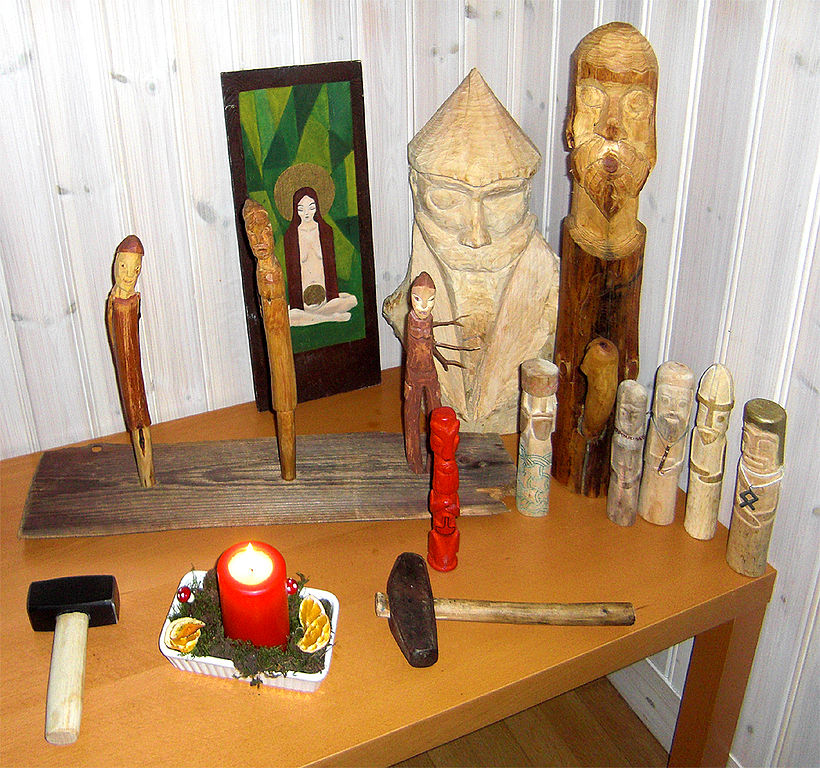 If one of the lesser known gods / goddesses calls to you, chances are you’re probably researching them. After all, if someone is knocking on your door, you probably want to know who they are before you let them in. No, not all gods, wights, and ancestors are good and beneficial to you. Some are downright harmful, which means you really don’t want them in your life. Some are beneficial and some are neutral.
If one of the lesser known gods / goddesses calls to you, chances are you’re probably researching them. After all, if someone is knocking on your door, you probably want to know who they are before you let them in. No, not all gods, wights, and ancestors are good and beneficial to you. Some are downright harmful, which means you really don’t want them in your life. Some are beneficial and some are neutral. 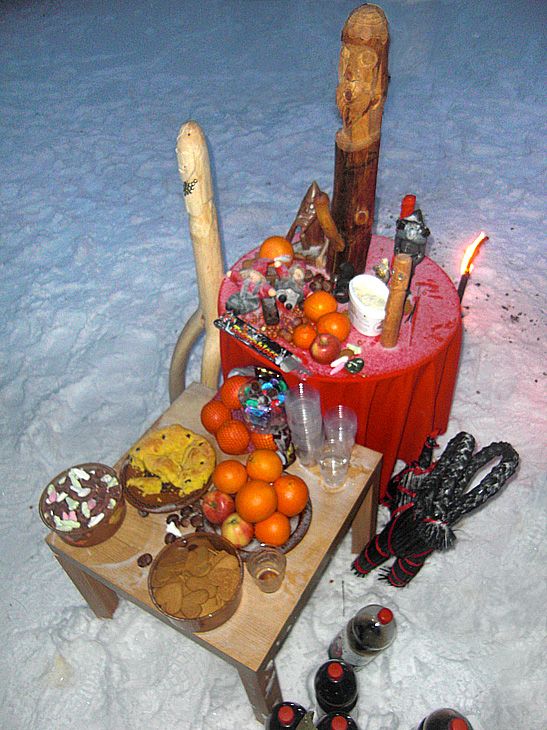 create a shrine on your altar, if you have one, or someplace in your home, if you don’t. It doesn’t have to be huge or ostentatious; something heartfelt that reminds you of the god or goddess works. For example, on my own altar, I have pine cones and images of dogs to Zisa. (Many think she is Tyr’s/Ziu’s consort.) By having something that honors the god or goddess on your altar, you can be reminded that this deity has a special place in your heart.
create a shrine on your altar, if you have one, or someplace in your home, if you don’t. It doesn’t have to be huge or ostentatious; something heartfelt that reminds you of the god or goddess works. For example, on my own altar, I have pine cones and images of dogs to Zisa. (Many think she is Tyr’s/Ziu’s consort.) By having something that honors the god or goddess on your altar, you can be reminded that this deity has a special place in your heart. There I go talking about Unverified Personal Gnosis again. Unverified Personal Gnosis or UPGs, the bane of most recons, can give you insight into the god or goddess that you can’t get anywhere else. While you can’t claim UPGs as being the absolute truth, they can give you a foundation for worshiping the god or goddess and provide the backbone of a relationship. Because they’re personal, you can’t expect your UPGs to be considered fact, but they are ideal for your relationship with a god.
There I go talking about Unverified Personal Gnosis again. Unverified Personal Gnosis or UPGs, the bane of most recons, can give you insight into the god or goddess that you can’t get anywhere else. While you can’t claim UPGs as being the absolute truth, they can give you a foundation for worshiping the god or goddess and provide the backbone of a relationship. Because they’re personal, you can’t expect your UPGs to be considered fact, but they are ideal for your relationship with a god.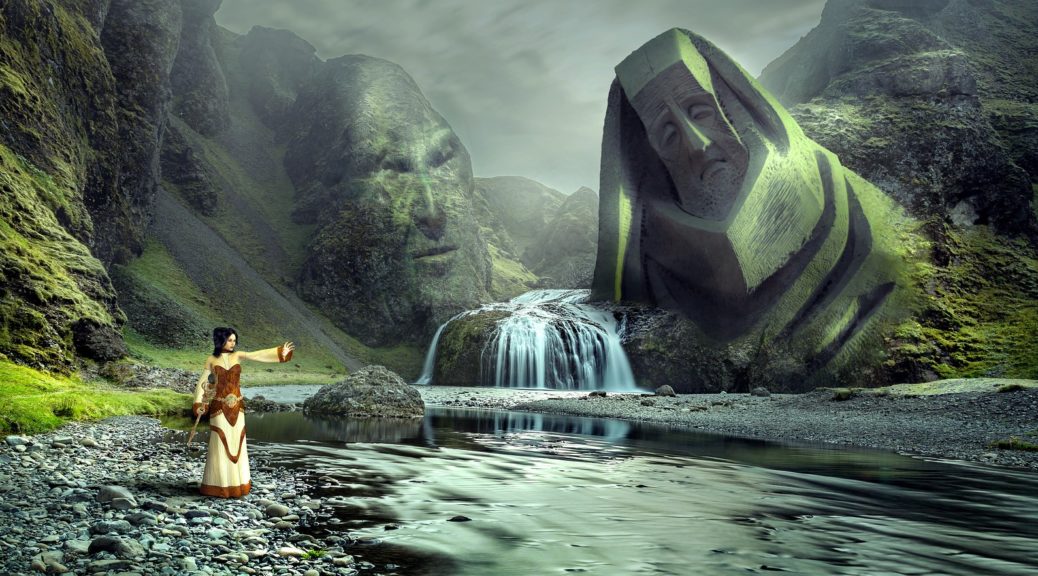

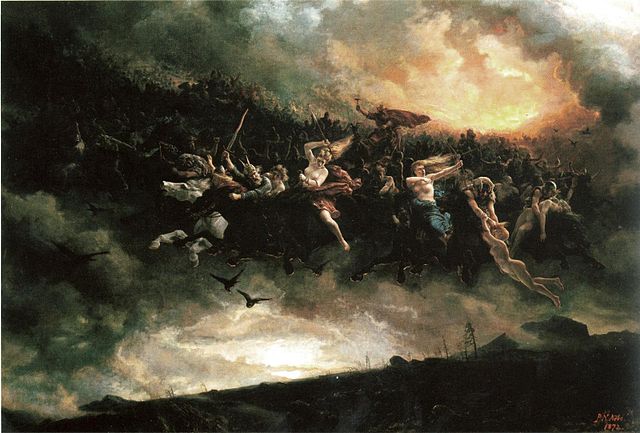 Moon and the Sun move across our sky, rather than the Earth revolving around the Sun and the Moon revolving around the Earth. That there really was a cow that licked the brine from Ymir and the gods, thus creating the first pantheons. That Odin along with his brothers slew Ymir and fashioned our Earth from Ymir’s bones. This is more fundamentalist than anything, and again, since you really believe that, nothing I’m going to tell you is going to make a difference.
Moon and the Sun move across our sky, rather than the Earth revolving around the Sun and the Moon revolving around the Earth. That there really was a cow that licked the brine from Ymir and the gods, thus creating the first pantheons. That Odin along with his brothers slew Ymir and fashioned our Earth from Ymir’s bones. This is more fundamentalist than anything, and again, since you really believe that, nothing I’m going to tell you is going to make a difference. Now, if you believe our gods manifest themselves in physical forms, that’s fine. I’m good with that. I believe that they can and do, but I also don’t believe that Asgard exists in our dimension. I tend to
Now, if you believe our gods manifest themselves in physical forms, that’s fine. I’m good with that. I believe that they can and do, but I also don’t believe that Asgard exists in our dimension. I tend to 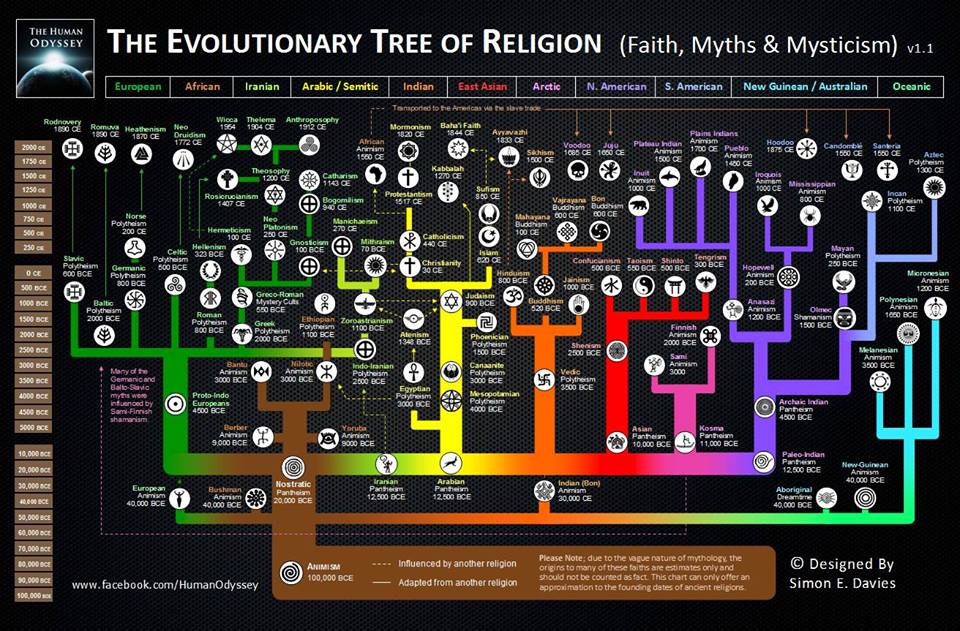
 Soft polytheism tends to look more at the concepts of the gods as archetypes. In it’s extreme form, it’s closer to atheism than a religion. I would not consider most soft polytheists in that group. Many are pantheists, which allows the worship of other gods, and it equates the universe with the gods. I sit more comfortably in the pantheistic version of Heathenry, because I believe that the universe and the gods are the same. My belief is our gods go by other names in other religions. I chose our gods not only because I am most comfortable with them, but because I have had interactions with them by those names.
Soft polytheism tends to look more at the concepts of the gods as archetypes. In it’s extreme form, it’s closer to atheism than a religion. I would not consider most soft polytheists in that group. Many are pantheists, which allows the worship of other gods, and it equates the universe with the gods. I sit more comfortably in the pantheistic version of Heathenry, because I believe that the universe and the gods are the same. My belief is our gods go by other names in other religions. I chose our gods not only because I am most comfortable with them, but because I have had interactions with them by those names.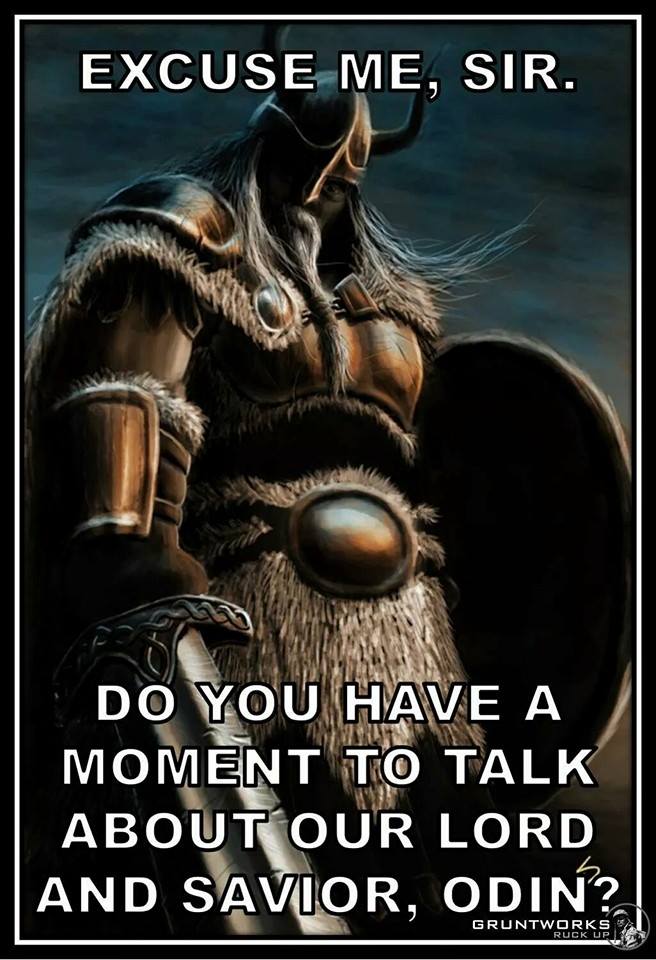
 On one of the myriad groups I occasionally hang out on, I noticed someone was asking if the Norse gods were the only gods. In this world of monotheistic gods, it’s not as strange of a question as pagans would like to think. Are the Northern deities the only gods out there? And if they aren’t, what makes them better than any other gods?
On one of the myriad groups I occasionally hang out on, I noticed someone was asking if the Norse gods were the only gods. In this world of monotheistic gods, it’s not as strange of a question as pagans would like to think. Are the Northern deities the only gods out there? And if they aren’t, what makes them better than any other gods?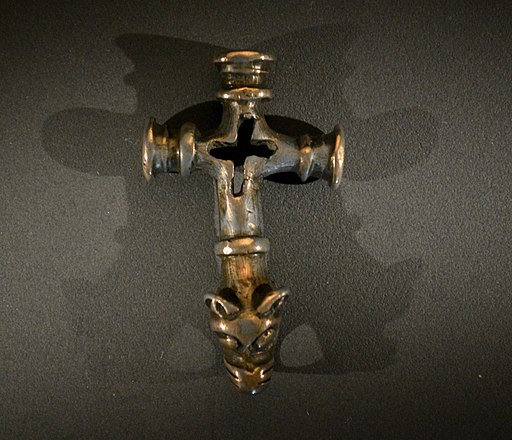 We know that the Icelandic peoples worshiped Jesus alongside the Norse gods, given the Icelandic Cross/Thor’s Hammer. It’s also suspected that the Vanir are a group of gods that got assimilated into the Northern pantheon sometime in the past, thus making the Aesir and Vanir to be two groups of gods that merged to give us our current pantheon.
We know that the Icelandic peoples worshiped Jesus alongside the Norse gods, given the Icelandic Cross/Thor’s Hammer. It’s also suspected that the Vanir are a group of gods that got assimilated into the Northern pantheon sometime in the past, thus making the Aesir and Vanir to be two groups of gods that merged to give us our current pantheon.
 pray for their god or gods to make things better when something bad happens. Or they pray to whatever wights and spirits in the hopes that things will improve. Prayer gives people a sense that they are doing something to change the situation. But, they’re not. Not really.
pray for their god or gods to make things better when something bad happens. Or they pray to whatever wights and spirits in the hopes that things will improve. Prayer gives people a sense that they are doing something to change the situation. But, they’re not. Not really. Now, before I get into my rant, let me first say that I have the utmost respect for the Native Americans. These people have been treated horribly–and are still being treated horribly–by the United States government. These people have, in many cases, been stripped of their culture, language, and religion, not to mention their freedom and their lives. Even into the 1950s and 1960s, children were being stolen from their parents, put in orphanages, and then sold to white people for a mere donation. I’ve known plenty of people with Native American ancestry and I respect them highly. What was done to their people is unconscionable.
Now, before I get into my rant, let me first say that I have the utmost respect for the Native Americans. These people have been treated horribly–and are still being treated horribly–by the United States government. These people have, in many cases, been stripped of their culture, language, and religion, not to mention their freedom and their lives. Even into the 1950s and 1960s, children were being stolen from their parents, put in orphanages, and then sold to white people for a mere donation. I’ve known plenty of people with Native American ancestry and I respect them highly. What was done to their people is unconscionable.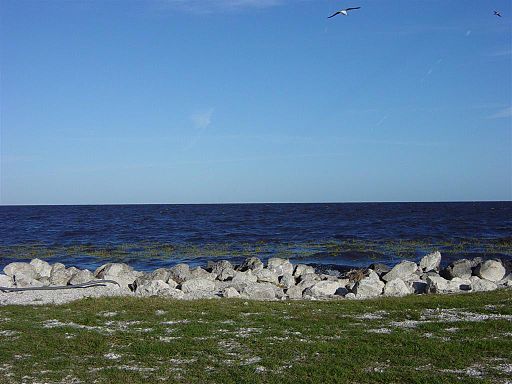 to control the lake’s waters. The lake, from what I understand, has a containment ring and
to control the lake’s waters. The lake, from what I understand, has a containment ring and  let me remind you all that
let me remind you all that  walk, I’d agree with you. It’s a good media promotion and one that will work given the nature of the situation. (Pardon the pun.) But prayer only goes so far, and
walk, I’d agree with you. It’s a good media promotion and one that will work given the nature of the situation. (Pardon the pun.) But prayer only goes so far, and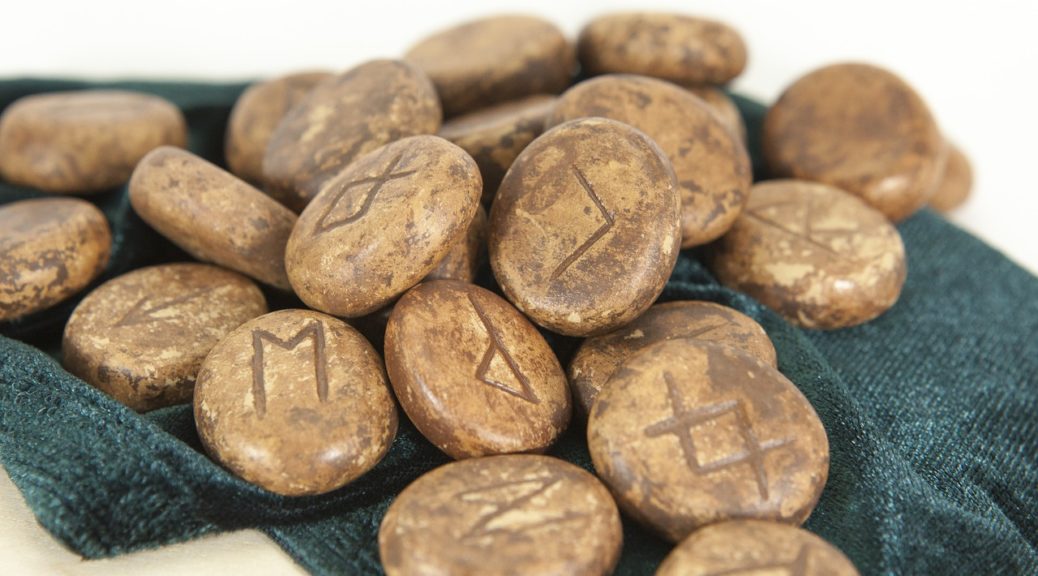
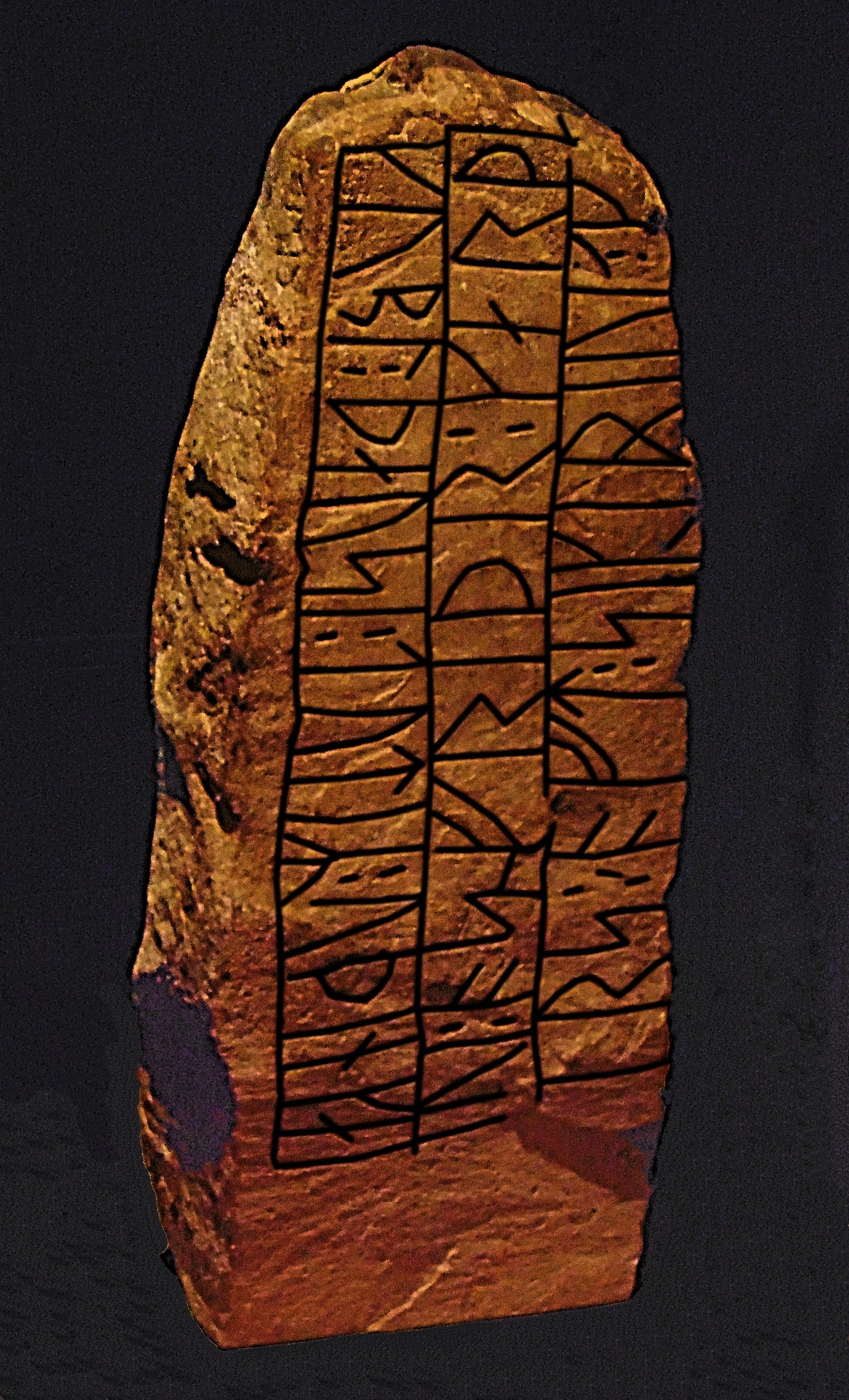 Runes — and writing, for that matter — is the human attempt at establishing immortality in a very mortal world. Look at the runic inscriptions we have from our ancestors: they talk about deeds, imbue power into weapons, mark the existence of a person, keep track of goods, or give us a magical formula of some sort.
Runes — and writing, for that matter — is the human attempt at establishing immortality in a very mortal world. Look at the runic inscriptions we have from our ancestors: they talk about deeds, imbue power into weapons, mark the existence of a person, keep track of goods, or give us a magical formula of some sort.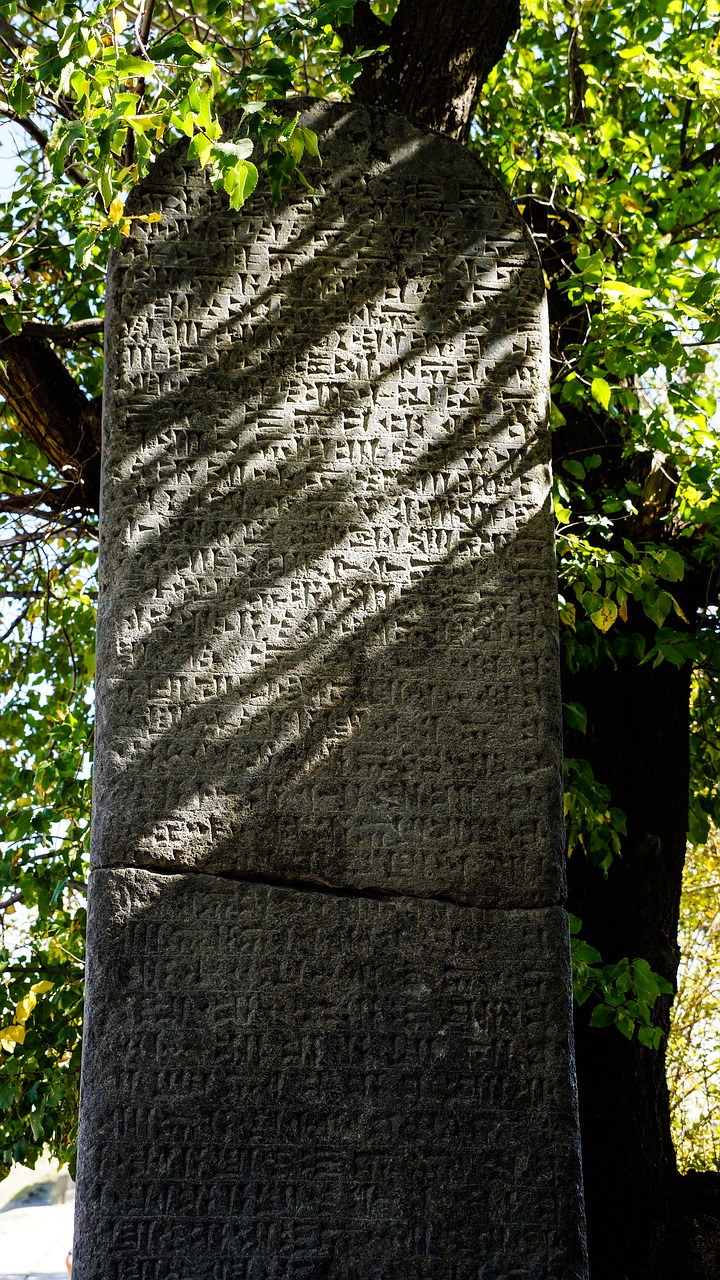 forego that avoidance. Writing, itself, is magical. Think about it. We can convey our thoughts, stories, feelings, and beliefs to people we have never met. To people whom we will never meet. This power is something we take for granted now, but writing has really only been around for a little over 5000 years. The
forego that avoidance. Writing, itself, is magical. Think about it. We can convey our thoughts, stories, feelings, and beliefs to people we have never met. To people whom we will never meet. This power is something we take for granted now, but writing has really only been around for a little over 5000 years. The 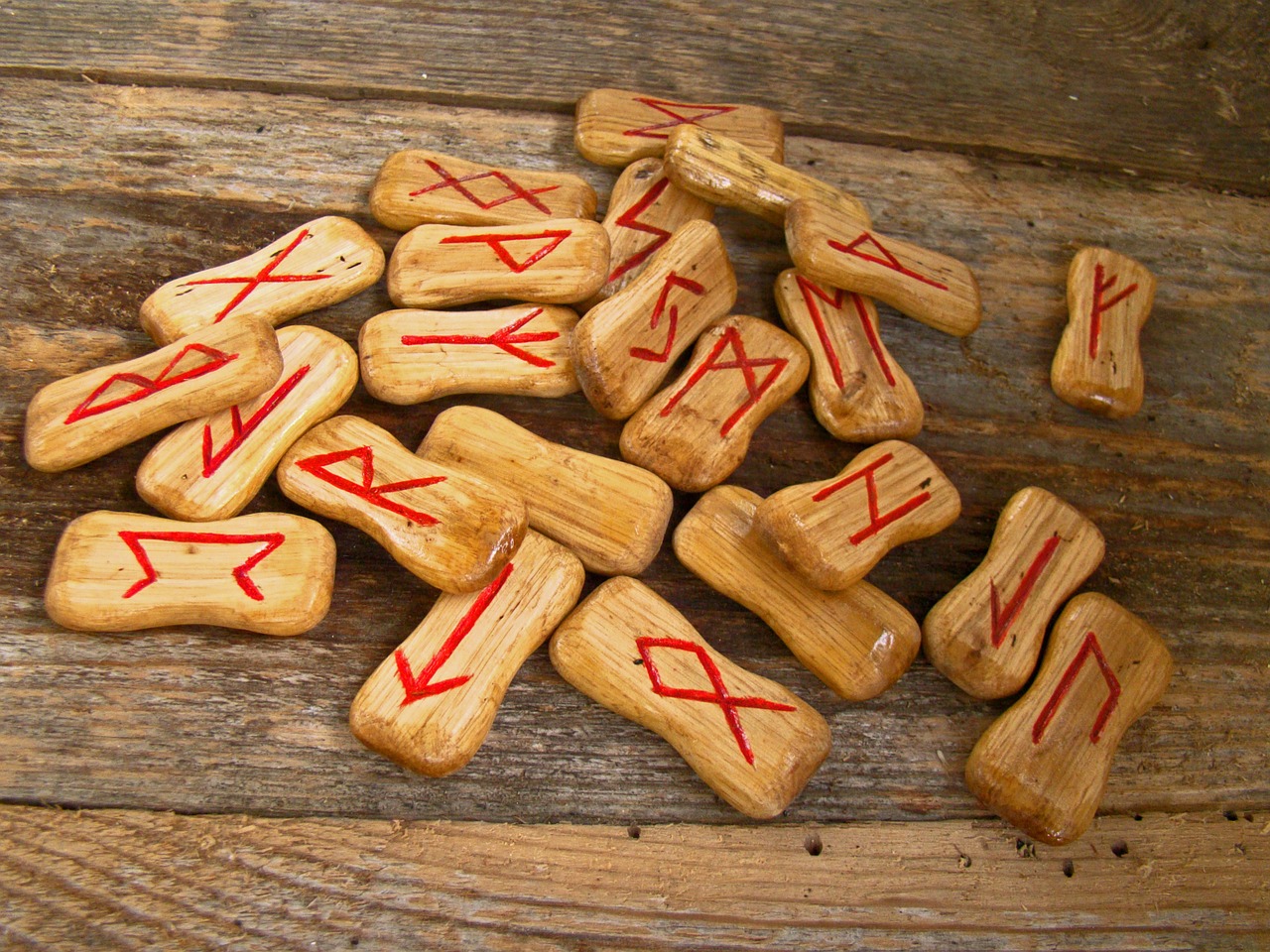
 If you’ve read
If you’ve read 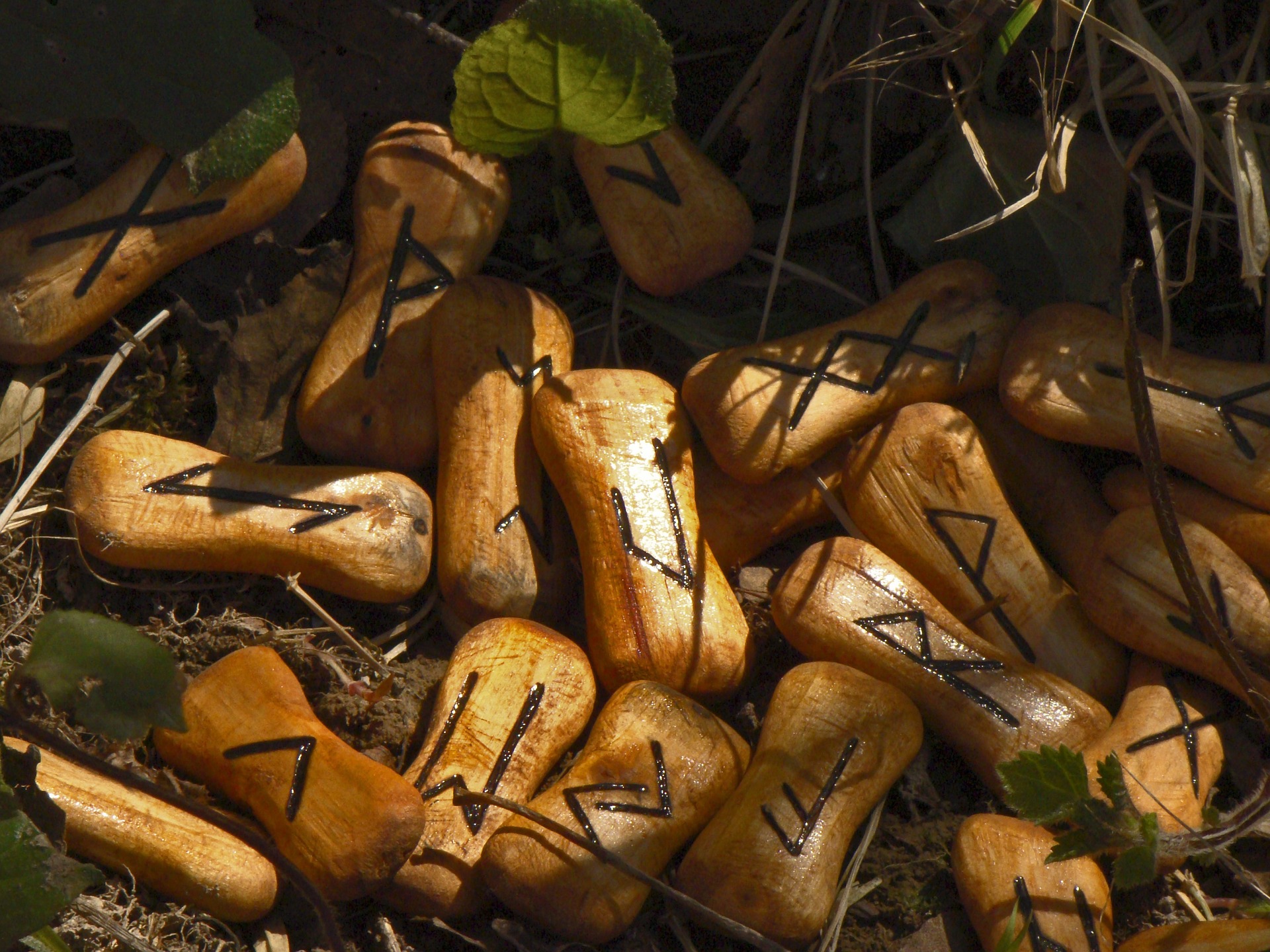 first edition somewhere, assuming it didn’t get lost in moving. Whether or not you think Blum’s book is a bunch of crap, you have to admit that it was and still is quite popular. I did some pretty successful runecasts with it, despite its faults.
first edition somewhere, assuming it didn’t get lost in moving. Whether or not you think Blum’s book is a bunch of crap, you have to admit that it was and still is quite popular. I did some pretty successful runecasts with it, despite its faults.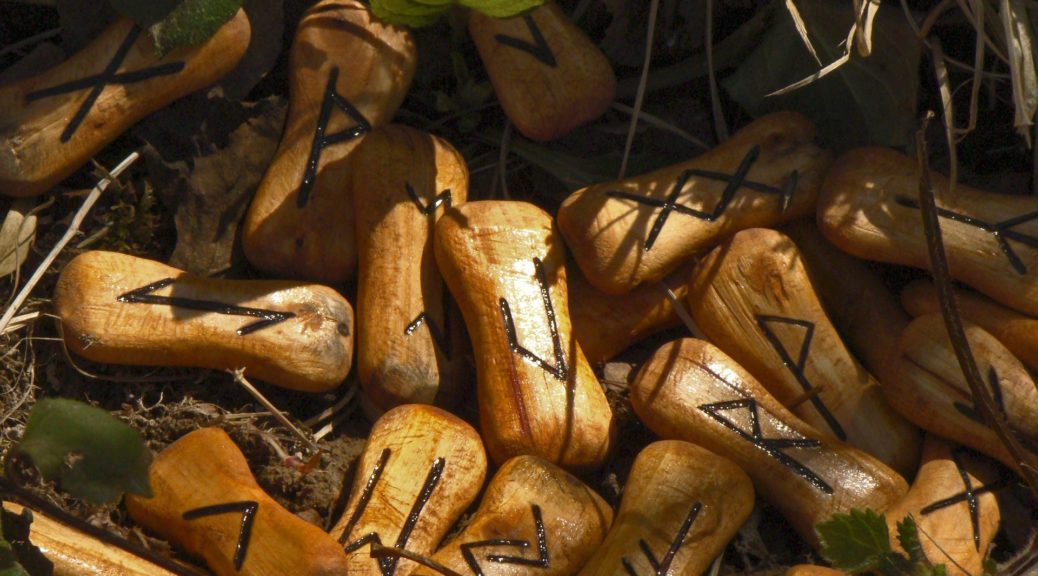


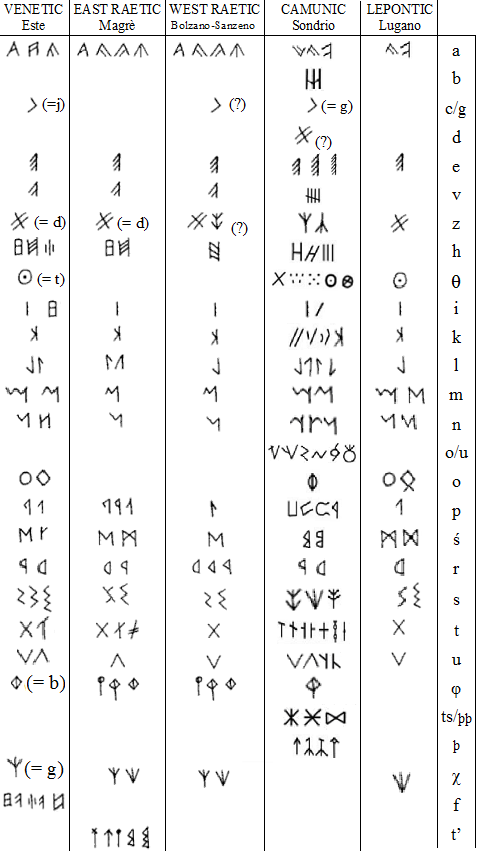 If we look at the runic alphabet from archaeology, we can get a sense for where the runes came from. Even so, it’s sort of a mystery how the runes came into being. We know that the oldest runes, the Elder Futhark, were written as early as 150 AD or CE (Common Era). But whence they came is as interesting as the story in the Havamal. Runes may have be derived from what are called the Old Italic Alphabets, which includes the
If we look at the runic alphabet from archaeology, we can get a sense for where the runes came from. Even so, it’s sort of a mystery how the runes came into being. We know that the oldest runes, the Elder Futhark, were written as early as 150 AD or CE (Common Era). But whence they came is as interesting as the story in the Havamal. Runes may have be derived from what are called the Old Italic Alphabets, which includes the